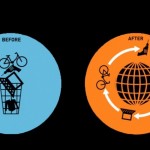More than half of UK GDP comes from small businesses. In the US, it has been quoted as high as 70%. At a meeting in Brussels, one of the ministers told us that if every small business was helped and encouraged to hire one new member of staff, there would be no unemployment in Europe.
So why am I a big supporter of the small, the underdog and the start-up. Because it is the lifeblood of our economy and it means people will continue to be creative, use technology to collaborative and think and share in communities rather moving backwards to an era where we clocked in and worked 9-to-5.
While big brands such as General Mills, General Motors and General Electric will still have their place, this is the ‘long tail’ of business. A billion little entrepreneurial opportunities ready to be exploited by smart, creative people. The future will be about ‘more’. More innovation, from more places and more people – people focused on narrow niches, where collectively all these producers will reinvent the industrial economy.
I liken it to the old days of small specialist shops and boutiques on a high street, but this time online, trading via Etsy or some other platform or ‘storefront.’ I don’t think we are too far away. In the meantime, I am happy to attend, support and present at events that encourage businesses of all sizes to come together and talk, share, exchange. I will be at Business Expo 3.0 (www.national-expo.co.uk ) on March 8th – we have a lot to learn.


